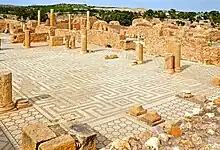palaestra
English
Etymology
From Middle French palestre, from Old French, from Latin palaestra, from Ancient Greek παλαίστρα (palaístra, “wrestling school”).
Pronunciation
- (UK) IPA(key): /pəˈliːstɹə/, /pəˈlʌɪstɹə/
Noun
palaestra (plural palaestras or palaestrae)
- (historical) A public area in ancient Greece and Rome dedicated to the teaching and practice of wrestling and other sports; a wrestling school, a gymnasium. [from 15th c.]
- 1990, Camille Paglia, Sexual Personae:
- Athenian culture flourished in externalities, the open air of the agora and the nudity of the palestra.
- An arena for literal or figurative combat; a battlefield. [from 15th c.]
Translations
Anagrams
Latin

palaestra Carthāginiēnsis
Etymology
Borrowed from Ancient Greek παλαίστρα (palaístra, “wrestling school”).
Pronunciation
- (Classical) IPA(key): /paˈlae̯s.tra/, [päˈɫ̪äe̯s̠t̪rä]
- (modern Italianate Ecclesiastical) IPA(key): /paˈles.tra/, [päˈlɛst̪rä]
Noun
palaestra f (genitive palaestrae); first declension
Declension
First-declension noun.
Synonyms
- (wrestling school): oleum
Related terms
Descendants
References
- “palaestra”, in Charlton T. Lewis and Charles Short (1879) A Latin Dictionary, Oxford: Clarendon Press
- “palaestra”, in Charlton T. Lewis (1891) An Elementary Latin Dictionary, New York: Harper & Brothers
- palaestra in Charles du Fresne du Cange’s Glossarium Mediæ et Infimæ Latinitatis (augmented edition with additions by D. P. Carpenterius, Adelungius and others, edited by Léopold Favre, 1883–1887)
- palaestra in Gaffiot, Félix (1934) Dictionnaire illustré latin-français, Hachette.
- “palaestra”, in Harry Thurston Peck, editor (1898), Harper's Dictionary of Classical Antiquities, New York: Harper & Brothers
- “palaestra”, in William Smith et al., editor (1890), A Dictionary of Greek and Roman Antiquities, London: William Wayte. G. E. Marindin
This article is issued from Wiktionary. The text is licensed under Creative Commons - Attribution - Sharealike. Additional terms may apply for the media files.